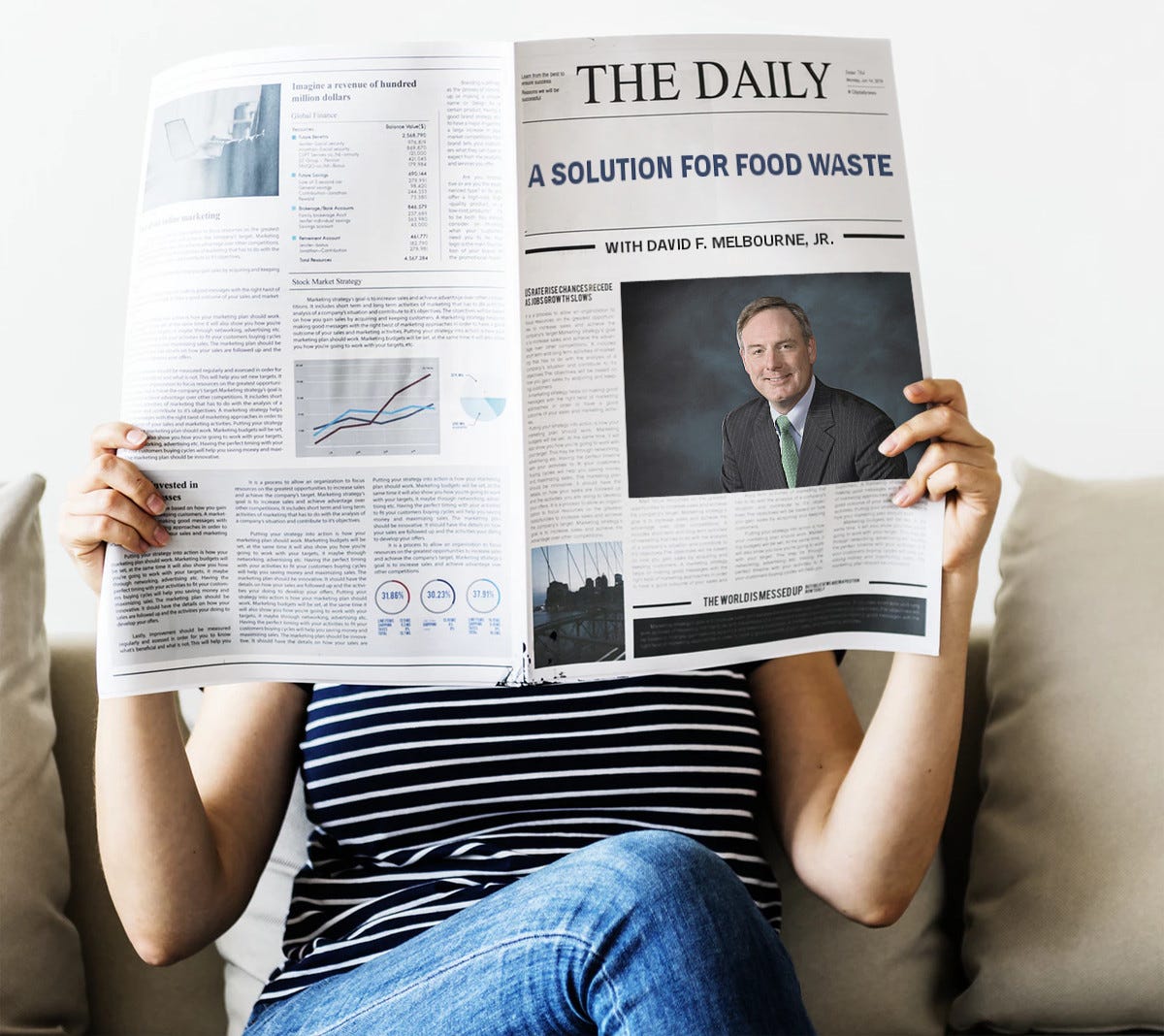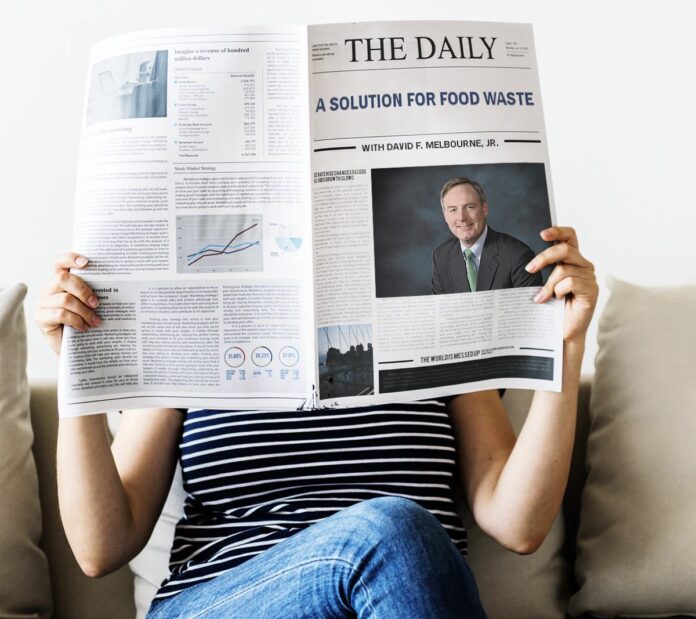“Let’s Find A Cost-Effective Solution For Food Waste” With David F Melbourne, Jr, SVP at Bumble Bee Seafoods

“A movement I would like to start is to find a viable and cost-effective solution for food waste — how can we use the massive amounts of food that are discarded each day to feed millions of people that are hungry and starving both domestically and globally.”
I had the pleasure to interview David F. Melbourne, Jr. Mr. Melbourne is senior vice president of consumer marketing and corporate social responsibility at Bumble Bee Seafoods, overseeing U.S. consumer marketing, advertising, corporate communications, media relations and the Company’s corporate social responsibility program. He is actively engaged in a variety of industry based initiatives including the National Fisheries Institute, Grocery Manufacturer’s Association, International Seafood Sustainability Foundation and the Shelf Stable Food Processors Association. Mr. Melbourne is a graduate of the University of Maryland College Park and completed Harvard Business School’s Advanced Management Program (AMP).
Thank you so much for joining us! Can you tell us about the initiatives that your company is doing to become be more sustainable?
At Bumble Bee, we’re committed to responsible, sustainable fishing practices and global resource management. Practicing sustainability is really an organizational imperative. The long-term sustainability of the world’s tuna resources is our priority and has had a major role in developing and implementing conservation measures that will ensure this outcome. Our sustainability program is specifically focused on ensuring the responsible harvesting and management of fisheries from which we source. Science is at the core of our approach to fisheries management and independent, science-based assessments of stocks are a key component in ensuring the sourcing of sustainable seafood. More specifically, our Corporate Social Responsibility initiative, ‘Shaping a Healthier Future,’ is a science-based and progressive approach to corporate sustainability that has gained the support of global organizations, encouraging the formation of the International Seafood Sustainability Foundation (ISSF) — an NGO partnership of scientists, the tuna industry and the environmental non-governmental organization community. Our sustainability program also involves other environmental initiatives, such as waste reduction and resource conservation, throughout its global processing, purchasing and logistics practices. Based on scientific research and initiatives underway within the global tuna industry in collaboration with the International Seafood Sustainability Foundation (ISSF) and supported by World Wildlife Fund (WWF) — the world’s leading conservation organization — it is fact that the tuna species used by Bumble Bee are healthy.
In 2015, we also launched a traceability feature on our website that enables consumers to track the source of their tuna product from catch to can by entering a code found on their can or pouch. Consumers can visit BumbleBee.com/TraceMyCatch, enter the production code found on the bottom of their can or the back of pouches, and view the results, which display information specific to the product, including species, fishing method, ocean of catch, vessel names and flags, fishing trip dates and processing location. We’re also able to trace products for food safety, as well as verify that the tuna entering our supply chain is legally harvested and meets all of our ISSF sourcing commitments.
We’ve made great inroads to ensure our products are safe, sustainable and convenient for retailers and consumers, and developing our traceability site is just one of the ways we are committed to providing quality products with complete transparency.

Are you working on any new or exciting projects now?
In 2016, Bumble Bee joined the Seafood Task Force, which is comprised of retailers, processors, NGOs, third-party Social Standard Audit groups and stakeholders within the fishing industry. Our objective in joining the initiative is to collectively develop a credible and practical social standard and audit protocol for tuna fishing vessels, thereby expanding the scope of social standards beyond production facilities to vessels. Additionally, Bumble Bee will soon announce the launch of Fishery Improvement Projects (FIPs) for our key longline albacore fisheries. The purpose of a FIP is to improve and move a fishery towards being able to meet the Marine Stewardship Council fishery standards.

Can you tell us about your journey to becoming SVP Consumer Marketing & Corporate Social Responsibility?
I found a deep-rooted passion for the marketing field when I was in high school and a participant in the Junior Achievement program. Graduating with a BS in Marketing from the University of Maryland College Park, my first CPG marketing experience was with U.S. Tobacco in Greenwich, Conn. where I served as a marketing analyst before moving into brand management where I worked on Copenhagen, the leading national brand of smokeless tobacco. It was the classical marketing training at UST that built a firm foundation and positioned me for continued growth.
In 1994, I made the move into the food industry, working for Castleberry/Snow’s Brands, a midsize, privately held manufacturer of leading regional brands of beef, pork, poultry and seafood products based in Augusta, Ga. The experience afforded me day-to-day interaction with all cross functional teams within the organization, and over the course of a decade, I served in a variety of roles including marketing, innovation and operations/supply chain. As one of the larger employers and supporters within the community, the company also provided me with the opportunity to work on numerous philanthropic initiatives locally.
I joined Bumble Bee in 2005, when the seafood giant acquired Castleberry/Snow’s Brands. I was thrilled to join a passionate, high-energy, environmentally-focused and entrepreneurial business where I had initial oversight over consumer marketing. Although a larger organization, my prior experience with managing cross-functional teams, working throughout all areas of an organization and building brands, allowed me to settle in quickly and hit the ground running. Within my first year, I assumed the senior leadership role for consumer marketing and communications (media relations/PR), which ultimately lead to my volunteering to build and lead the day-to-day corporate social responsibility initiative for the company. Over the last 13 years, I have had the pleasure of working with an outstanding team, elevating a heritage brand and effectively driving positive change in fisheries, our environmental impacts and social responsibility standards.
Can you share the most interesting story that happened to you since you began working at Bumble Bee?
To be completely honest, there are too many to choose from! It is rare that I have days when I’m not dealing with something new or different.
What is your definition of success?
I firmly believe that all individuals must be passionate about whatever they do and have a hunger for constant learning. I was raised by parents that instilled a very strong work ethic and that has served me well over the years. I am an advocate for building collaborative and transparent teams, and also establishing a strong culture that embraces a sense of urgency, respect for all stakeholders, a drive for results and the importance of celebrating success. Finally, it is critical, in my opinion, to make a personal difference, be a strong mentor (I wouldn’t be who I am today without important mentors in my life) and being a positive influence whenever and wherever possible.
What failures have you had along the way? How have they led you to success?
In my 30 years of professional work, I have had plenty! Programs that didn’t achieve expectations, innovation that failed in market, relationships that went south. However, I treat all experiences as a teachable moment. I need to learn from failures, but also wins. I believe you need to take chances, step outside the comfort zone and be extremely flexible and decisive. People make the biggest difference and we all need to challenge each other to make any “end result” that much stronger.
What do you think makes your company stand out? Can you share a story?
Bumble Bee is truly a pioneer and leader within the seafood industry on so many levels. Our corporate social responsibility program is a perfect example and not something we have historically boasted about or marketed publicly. It is part of our DNA and supported top down and bottom up — we do what we do because it’s the right thing to do for people, profits and our planet. We are beginning to tell the story in a more pronounced way at this stage in hopes of inspiring others and educating a wide spectrum of stakeholders in a science-based approach.
What advice would you give to help their employees to thrive?
Be passionate, embrace change, work hard, be collaborative and have fun in the process. Find something that you love to do and focus on how you can make a personal difference and always strive to learn more. Challenge yourself.
None of us are able to achieve success without some help along the way. Is there a particular person who you are grateful towards who helped get you to where you are? Can you share a story about that?
There have been a number of people in my life that provided incredible guidance along the way. My parents — always supportive and instilled so many important elements on who I am as a person and as professional, and how I treat others. My wife of 28 years that has always had my back, supported my extreme work schedule and who is quick to remind me of what is important in life and that balance is imperative. Finally, key former supervisors and executives that took me under their wing, challenged me, gave me opportunities, allowed me to fail and try again, took time to sit down with me and talk candidly about a host of topics. I would not be where I am today without any of these critical influences and for that I am extremely grateful.

How have you used your success to bring goodness to the world?
On the professional side, I try and be available to colleagues in any capacity — as a mentor, a sounding board or a career coach. Personally, my family is focused on a variety of philanthropies and initiatives that span the arts, education, health care and environment. Finally, it is my intention to end my career focused on “giving back” and working for a foundation, NGO or non-profit operation.
What are your “5 Things I Wish Someone Told Me” and why.
This might also be stated five things someone told me and I wish I listened to! I’ll point out several.
1. I wish someone told me early on not to take things so seriously and to just laugh more!
2. Enjoy the wins and relax more often.
3. You don’t always have to have the answers or solutions.
4. Trust your instincts.
5. Restoring a farm house built in the late 1700’s is always going to be more complex than you think.
If you could inspire a movement that would bring the most amount of good to the most amount of people, what would that be?
Finding a viable and cost-effective solution for food waste — how can we use the massive amounts of food that are discarded each day to feed millions of people that are hungry and starving both domestically and globally.
Can you share your favorite “Life Lesson Quote”? Can you share how that was relevant to you in your life?
There are so many profound, inspirational and well-known quotes from amazing human beings and I really don’t have one in particular that is my favorite. There is a quote (not sure if it is attributable to anyone specific) that I actually find myself using over the years and that is: “There is no ‘I’ in TEAM”.


